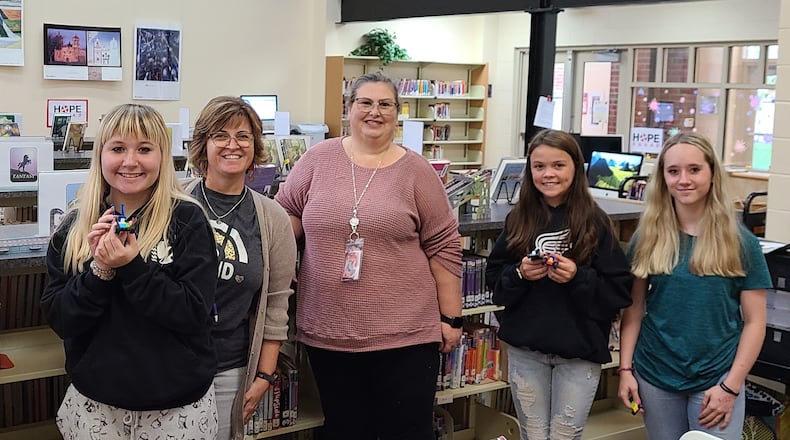“Students watch a video about the CTC program and do a hands-on activity related to that program,” said Kathy Oaster, library/media specialist, who helped come up with the program.
The programs have included:
Automotive in October: Students made LEGO cars and raced them down the track, with the goal of making the fastest car.
Engineering in November: Students were given a kit of various materials and instructed to design a ramp of sorts to gently move a marble from a higher surface to a lower surface — mimicking taking luggage from an airplane (higher surface) to a baggage cart (lower surface).
Medical/dental in December: Students learned how to take a manual blood pressure and care for teeth.
Education in January: Students had two identical LEGO sets. With a blind between them, the designated “teacher” needed to explain how to build an object to the “student” without seeing it by describing the piece and where to place it. After they were done, they compared the finish products.
Cosmetology in February: Students are learning how to style hair
This month will be criminal justice, and April will be aviation.
At the end of each class, students complete an exit survey that gives feedback to help Oaster to prepare what to do for the next career focus.
“I have had a very positive response from students. Many knew very little about the CTC and what programs they offer. They also really enjoy the hands-on activities as a way of learning more about the career,” she said.
The career cafe idea started at the end of last year by Oaster after Melinda Scaggs, school counselor, shared at a staff meeting about career kits put together by the Springfield-Clark Career Tech Center (CTC).
Oaster, who started with the district last year, thought the kits were a perfect idea. She then met with Pamela Noeth, senior director of Curriculum, Instruction and Innovation at CTC, and spoke with the school principal, superintendent Paula Crew and the school board, who “were all in favor of the idea.”
As a media specialist, Oaster runs the library and manages computer needs. When she started with the district last year, she had a part-time library aide, a position that was eventually not replaced. Being the only one in the library, she found it difficult to teach full classes and help classroom teachers with lessons because she would get pulled away several times to help students with library needs.
“I found running full lessons with classes was a challenge, since I often got pulled away to manage student’s library and computer needs. I needed to find something that allowed for flexibility,” she said. ““I now meet with classes for a shorter period of time. I found I had a bit of extra time on my hands, and thought I could use that time to offer something more/different for the students. Thus, the Career Cafe was born.”
The program is optional. Oaster gave a sign-up sheet to the study hall teacher that showed all the different programs through the year. Students can then sign up with the study hall teacher, with most groups being full or have a waiting list.
CTC Superintendent Michelle Patrick said they’re thrilled to partner with the middle school for this program with their 14 available kits. More than 6,500 CTC kits have been used since they started in the fall of 2022.
“The Future Ready Career Awareness Kits expose students to different career fields and jobs within that field. Interacting with kits helps students discover their own interests and strengths and even what they don’t like. The kits are hands-on, engaging, and spark students to have career-related conversations with teachers and family members,” Patrick said.
Oaster and Scaggs also recently wrote and received a Tecumseh Education Foundation Teacher Grant to purchase items for the career cafe as the library budget is not used to fund this program.
“This program doesn’t need a lot of money to run. It simply takes a bit of time to prepare and some creative thinking,” Oaster said. “My district has been extremely supportive of this program. I am shocked at how this random idea I had one day has been embraced by my district.”
Along with the middle school, the kits have also been requested by K-8 classrooms, homeschoolers, scout troops, community members and summer campers. Kits are complementary and available at SCCTC.org/Kits or the Clark County Public Library.
About the Author


